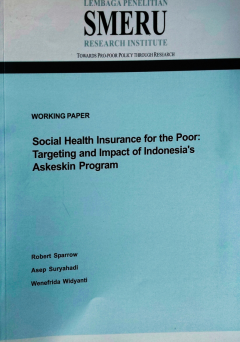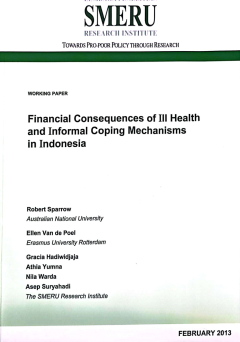Ditapis dengan

Social Health Insurance for the Poor : Targeting and Impact of Indonesia's As…
Social Health Insurance plays a crucial role in ensuring equitable access to healthcare services, particularly for the poor and vulnerable populations. Indonesia's Askeskin program serves as a case study in this research, focusing on its targeting mechanisms and the impact on healthcare accessibility and financial protection.
- Edisi
- 1
- ISBN/ISSN
- 9789793872759
- Deskripsi Fisik
- 27 halaman
- Judul Seri
- Textbook
- No. Panggil
- 368.409598 SPA s

Financial Consequences of Ill Health and Informal Coping Mechanisms in Indonesia
We assess the financial risk of ill health for households in Indonesia, the role of informal coping strategies, and the effectiveness of these strategies in smoothing consumption. Based on household panel data, we find evidence of financial risk from illness through medical expenses, while income from informal wage labor is exposed to risk for the poor and income from self-employed business act…
- Edisi
- 1
- ISBN/ISSN
- 9789793872988
- Deskripsi Fisik
- i, 16 hal. ; 30 cm.
- Judul Seri
- Textbook
- No. Panggil
- 332 SPA f
 Karya Umum
Karya Umum  Filsafat
Filsafat  Agama
Agama  Ilmu-ilmu Sosial
Ilmu-ilmu Sosial  Bahasa
Bahasa  Ilmu-ilmu Murni
Ilmu-ilmu Murni  Ilmu-ilmu Terapan
Ilmu-ilmu Terapan  Kesenian, Hiburan, dan Olahraga
Kesenian, Hiburan, dan Olahraga  Kesusastraan
Kesusastraan  Geografi dan Sejarah
Geografi dan Sejarah